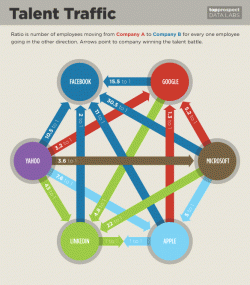 Tech hiring is tough and it’s only going to get tougher, says a new report from Dice.com.
Tech hiring is tough and it’s only going to get tougher, says a new report from Dice.com.
The IT specialty job board said its survey of IT employers found 65 percent expect to do more hiring of tech professionals in the second half of the year. That kind of robust hiring is already bumping up against the low unemployment rate for computer professionals. The U.S. Bureau of Labor Statistics put the unemployment rate for computer and math occupations (a category that includes actuaries and some other small groups) at 3.8 percent. Last year the rate for May was 5.5 percent.
Postings for information technology jobs increased by 41 percent over may of 2010, according to Indeed.com. The government’s count of job openings for the information industry (a classification that includes more than just IT) was 110,000 in April. During that month, there 69,000 hires.
While the various data points aren’t directly comparable, they help explain why half the 900 IT recruiters and hiring managers Dice surveyed reported that time to hire is getting longer; 64 percent of the respondents say the problem is finding qualified candidates for the jobs.
 That shortage is also causing employers to pay more; 47 percent of the respondents said new hire salaries are slightly to significantly (7 percent) higher than last year. Six months ago, Dice found 29 percent of the surveyed recruiters and hiring managers reporting a rise in starting salaries.
That shortage is also causing employers to pay more; 47 percent of the respondents said new hire salaries are slightly to significantly (7 percent) higher than last year. Six months ago, Dice found 29 percent of the surveyed recruiters and hiring managers reporting a rise in starting salaries.
“Technology professionals are the basis for innovation, efficiency, and creating an agile workplace,” said Tom Silver, SVP, North America of Dice. “Now is the time to ask for more money. Negotiate hard at the outset of a new job because that initial salary may set the base for the next three years.”
Just how much depends on the job, experience, and skill. Programmers with Java chops, which Dice said is the hardest skill to find, will get more — much more — than the $54,000 national average being paid to entry-level programmers. Salary.com says the national average for a senior Java developer is $94,000. And more recruiters are looking for experienced workers, says Dice. The most frequent experience range mentioned is 6 to 10 years.
Mobile and .net skills are also among the hardest skills to find, notes the Dice report, which says that finding workers is toughest in the East and Midwest, where two-thirds of the survey respondents said they are hiring from out of the area.
In Silicon Valley, where retention is such an issue Google last year gave everyone a 10 percent raise, tech mobility is taken for granted. Top Prospect, a social recruiting referral site, looked through its user base to see who changed jobs in the last two years and where they went. The top companies were Apple, Facebook, Google, LinkedIn, and Microsoft.
 Not much of a surprise there. All of them have been hiring aggressively, and even if they weren’t, Microsoft, Apple and Google are so big that just replacing workers would put them at the top of the list.
Not much of a surprise there. All of them have been hiring aggressively, and even if they weren’t, Microsoft, Apple and Google are so big that just replacing workers would put them at the top of the list.
But Top Prospect took the analysis one step further and looked at where workers left, and developed a ratio of inbound to outbound workers. The fewer workers who leave, and the more who join, push a company higher in the rankings.
On that basis, Twitter came out on top. The 140-character broadcast service hired 10.9 workers for every one it lost. It was followed by Facebook at 8.1 hires, Zynga (the gaming company) at 8.0, LinkedIn 7.5, and Groupon 3.9.
The chart shows the big movers. The numbers in the arrows (click the graphic) tell you how many workers a company lost for every one they gained.